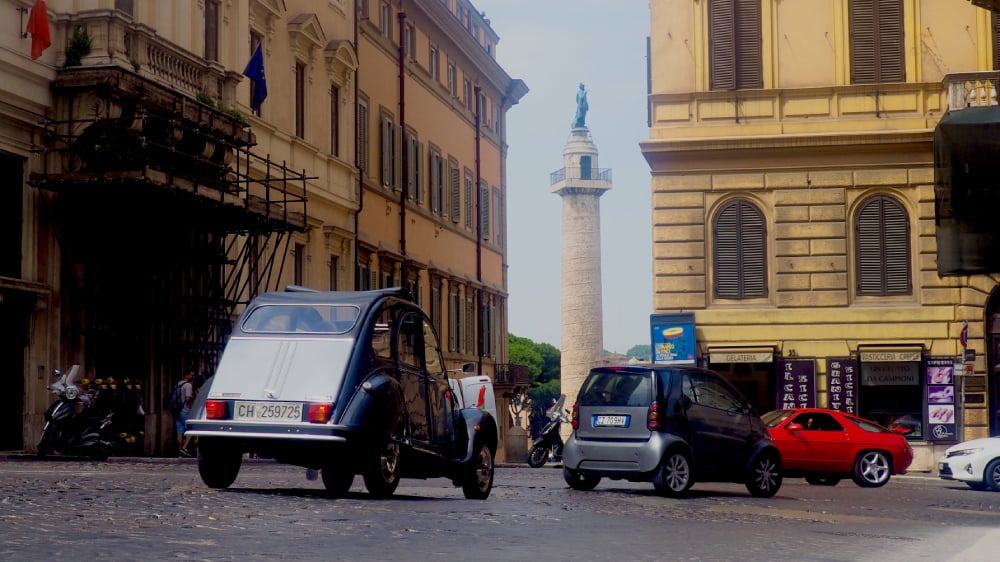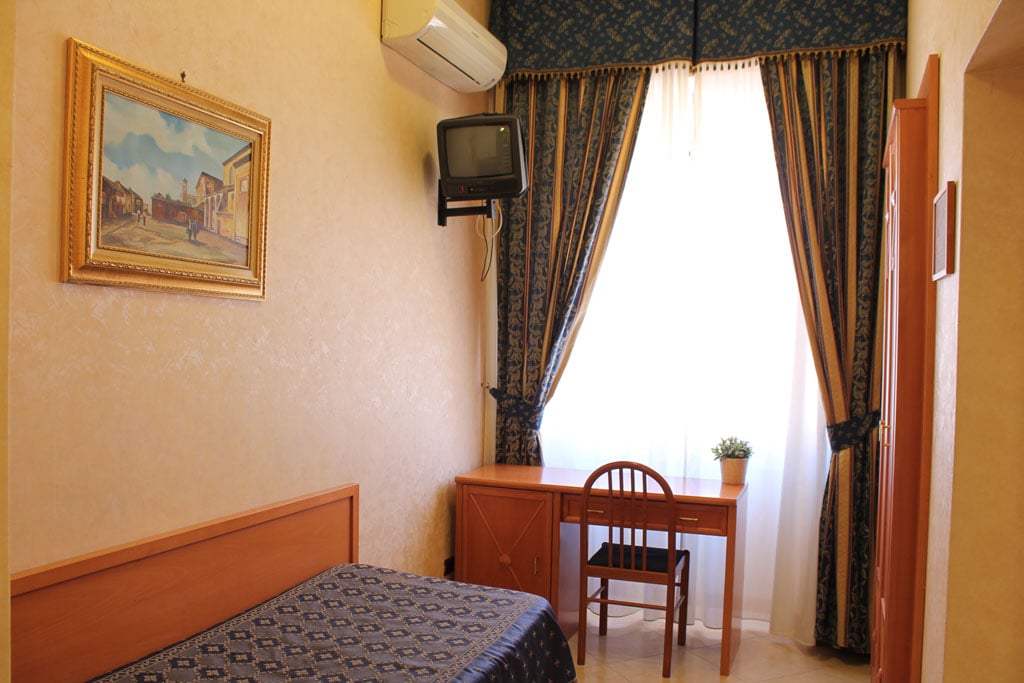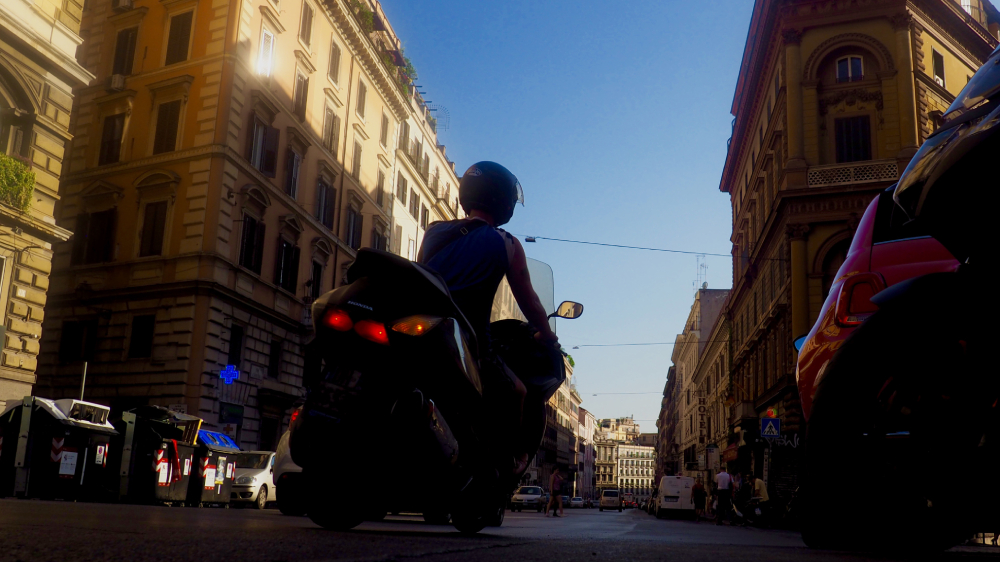Rome is an important place for me. I have an apartment in Rome. That's how it feels to me, anyway. It's really just a hotel room — a very particular room though, located in the Hotel Orlanda.
Orlanda is a modest, two-star family-run inn, occupying the third and fifth floors of a building it shares with a handful of other establishments on Principe Amedeo, a few blocks from Termini train station. Since my first stay in 2005, I have returned at every opportunity. They always give me the same room. I feel defiantly proprietary about that room, like a guy showing up at a high school reunion in a rented Ferrari. As far as I'm concerned, #505 is my own little home in Rome.
According to myth, Rome was founded exactly 2,773 years ago. April 21 was a sacred festival day. It seems a safe bet that by April 23 there were dudes in centurion outfits posing with tourists, but the archaeological record does not support this.
It is however well documented that during the succeeding centuries, life for Romans has not all been panem et circenses. There have been barbarian hordes, looting, civil wars, famines, floods, obnoxious Texans demanding overcooked pasta, sticky rivers of melted gelato. The Eternal City has always made it through. But in the spring of 2020, Rome faces more problems. One is disease. The other is desertion.
COVID-19 first hit China hard in December 2019. It spread gradually to other countries and territories until, like Death riding a pale Secretariat, Italy broke away from the pack as first its infection rate and then its death toll increased exponentially. Soon all Italy was in lockdown.
Almost overnight, the frantic streets of Rome were reduced to empty corridors. In the Piazza del Popolo there was not a pocket to pick. A city of practiced multilingual retailers became monoglots again. Photos offered spooky scenes of a city as full of ghosts as the Colosseum.
I watched the sad news reports from my apartment in Vancouver and thought about Marco and Paolo and Teresa. Whenever I visit the Hotel Orlanda, manoeuvering my suitcase out of the ancient, phone booth-sized elevator and into the third-floor office, Marco will give a cheer from behind the counter: “Steve! Il mio mito!” His brother Paolo, more reserved, will just smile, shake my hand, and hand me the key (along with the air conditioner control, waiving the surcharge). Next morning in the breakfast room their sister Teresa will kiss me on each cheek and ask why I wasn't here last year. They all seem as happy to see me as I am to be there.
But in the spring of 2020 no one was very happy in the city of St. Peter. As the crisis escalated, Paolo sent me a grim update from Orlanda. “In 15 days we went from 90 per cent reserved for March, April, and June, to zero,” he wrote. “Last night we closed the hotel with zero guests. It is worse than a tsunami since you know it will last at least three months. For now, you only see the zeroing of the economic system. The main problem is to pay wages, when you do not collect anything and the government tells you nobody should lose their job. Strength and courage, we will do it.”

Why was Italy hit so hard, so early, by COVID-19? There have been plenty of theories — the age of the population, the initially ineffective government response, and the simple fact that the Italians were unlucky pioneers forced to navigate a perilous new reality and make mistakes for others to avoid. But perhaps part of the problem is popularity. In any major hub airports are meeting points for millions who flow through and then separate, tracing paths like shrapnel arcing from so many cluster bombs. Countless little cluster bombs have dropped from the Italian skies since the establishment of commercial flight, a dubious benefit of being one of the most-visited destinations on the planet. Tourism: infected hands across the water.
Italian authorities may have been slow to react. But since the shutdown began it has been enforced in a way that is not likely to be tolerated in the United States. Roman residents have been allowed out to buy food, medicine, to make emergency doctor visits, or walk their dogs as long as they stick close to home. Once they get too far off the block the hammer comes down. Globe and Mail European bureau chief Eric Reguly went for a walk by the Circo Maximo in early April and was stopped by the carabinieri, Italy's military police. “Had my journalist documents but they still gave me a hard time,” he reported on Twitter. “Carabinieri fined a distraught jogger 400 euros while I was standing there because she was outside her immediate 'hood. One of the carabinieri told me they fined a guy 3000 euros for driving over to a friend's house to have some beers.”
Another Roman was fined 400 euros for walking her turtle. Perhaps there was an ambulance behind her.
I always hated the crowds in Rome. Now as photos of deserted streets and closed shops proliferated online it seemed one would need an almost psychopathic level of detachment not to grieve their absence. Obnoxious visitors, it seems, have long been the lifeblood of that legendary metropolis.
The New York Times recently published emails exchanged by some top American epidemiologists, written early this year as the pandemic gained strength around the world. One of them, Dr. Carter Mecher, medical advisor at the Veterans Administration, compared the situation to the deadly Mann Gulch Fire. That incident took place in the Helena National Forest in Montana on Aug. 5, 1949. At 5:45 p.m. that day the smokejumpers saw the fire racing up a slope toward them. Within the next 10 minutes it was estimated that the blaze exploded over 3,000 acres. Thirteen of the 16 firefighters died.
In an email dated Feb. 20, 2020, Mecher wrote: “Remember the story about Mann Gulch? We are at the equivalent of about 5:44. I anticipate that when we reach 5:45 there is going to be chaos and panic.”
Bingo. As April drifts along nations are left looking at escalating death rates, not to mention a great gaping chasm where their economies used to be. And a significant missing piece of the economic fabric is tourism.
Estimated global tourism revenues for 2019 range widely — it seems not everyone includes the same sectors when making calculations — but they generally fall around US$6 to 9 trillion. The B.C. Tourism Industry Association estimates this province generates $19 billion in annual tourism revenue, has 19,000 tourism-related businesses and 300,000 jobs.
All of that dried up almost instantaneously. Even so, the travel industry buzzed along for a while like a lawnmower on a sidewalk. In the first weeks of the pandemic Travelocity and Trivago ads were sprinkled among TV news stories announcing travel bans and cancelled events. Email offers for hotel and airfare bargains still arrived daily. Lottery commercials offered dream vacation prizes even as the government was warning people not to board cruise ships.

Meanwhile many observers have pointed out that a sense of looming danger generated by the pandemic is what has been lacking in the climate change debate. I was particularly struck by Dr. Mecher's Mann Gulch Fire analogy. I had already been thinking about wildfires, gazing out my window at the flowering trees of April. Two of the previous three summers had seen Vancouver shrouded in a smoky pall as forest fires raged to the north, east, and south. The pervasive campfire reek and the red sun smouldering in the summer sky had done more to bring home the dramatic potential of climate change than perhaps any other event. Melting glaciers are faraway. This smoke was in your eyes, your mouth, your lungs.
Now when I thought about the upcoming summer arriving on the heels of a COVID-19 spring, the prospect loomed of a dire succession, a dark new reality — the revolving seasons of Hell.
Climate change has been the number one scientific story in media and government for years. But wildfires and shrinking glaciers notwithstanding, climate change has not yet become a fully transformative force. It's too slow, too vague. Massive events like the COVID-19 pandemic or 9/11 are better at creating rapid changes in public perception. People die; the stock market plummets; the world changes. Fear moves the needle.
And yet the two stories — climate change and COVID-19 realities — have indeed merged. The spring of 2020 is showing us a world almost entirely without recreational travel. The environment is experiencing short-term benefits from the plunge in emissions. It seems like a good time to take stock. Is global travel still a justifiable pursuit? Is the travel industry fatally wounded?
A reassessment of the travel industry was already underway before our COVID-19 spring. There are plenty of reasons for that. International air travel impacts the climate; mass tourism devastates the very sites it seeks to exalt. Perhaps the real meaning of the journey, environmentalists argue, is the landscapes we befoul along the way.
Then there is the frequently blundering tread of the blithe globetrotter — the crude misconceptions, boorish behaviour, and cultural voyeurism that generate cross-cultural animosity instead of increased global understanding. Tourism may boost economies, but when does economic opportunity shade into exploitation? When does appreciation become desecration? Can tourism play a role in propping up corrupt and brutal regimes?
Tourists face difficult personal questions too. Why do we travel? What drives us from home? Socrates certainly saw no point in it. “Why do you wonder that globe-trotting does not help you, seeing that you always take yourself with you?” said the annoying philosopher. “The reason which set you wandering is ever at your heels.”

Will international tourism suffer permanent damage from COVID-19? It's all guesswork at this point. But my guess is no. Even as hazmat-suited forensic investigators boarded the Ruby Princess cruise ship in Sydney, retrieving the black boxes as part of a criminal investigation into 10 onboard deaths, cruise ship bookings remained robust for 2021. Wise or foolish, the desire to return to normality is powerful.
Nor do I think that a severe curtailment of international tourism would be a positive force in human affairs. If wanderlust has become criminal I am definitely a suspect. I do not feel ready to say goodbye to the places I have come to know. I particularly don't want to sing a final chorus of Arrivederci Roma.
People love to fantasize about the things they would do and the luxuries they would indulge in if they ever won the lottery. One of my little fantasies is becoming fabulously rich so I could prove to my friends at Hotel Orlanda that I would come back to room #505 regardless of how much money I had.
Can I really claim true friendship with people I pay money to stay with? I hope so. I think so. They need the money and I want them to thrive so it's interdependence, like bees and flowers or sea anemones and clown fish. I do think of them as real friends. I want our friendship to continue. I want it to be sustainable.
But the environmental impact of travel is real. And while I have tried to be an enlightened visitor, I know that I am still a small piece of shrapnel in an airborne cluster bomb — or perhaps one locust in an annihilating swarm.
Whatever I might choose to call myself, I am still a tourist. That identity may well become a badge of shame in the time to come. If so, I will wear it under certain circumstances. As soon as I am allowed, as soon as the tsunami subsides, I intend to walk through the doors of the Hotel Orlanda and make my reunion with Marco and Paolo and Teresa. ![]()
Read more: Travel, Coronavirus
















Tyee Commenting Guidelines
Comments that violate guidelines risk being deleted, and violations may result in a temporary or permanent user ban. Maintain the spirit of good conversation to stay in the discussion.
*Please note The Tyee is not a forum for spreading misinformation about COVID-19, denying its existence or minimizing its risk to public health.
Do:
Do not: